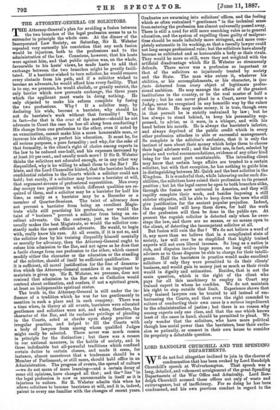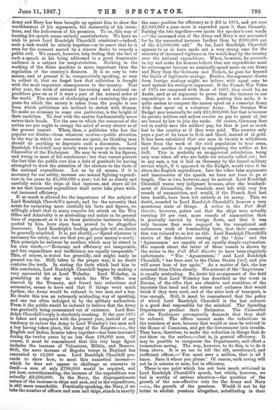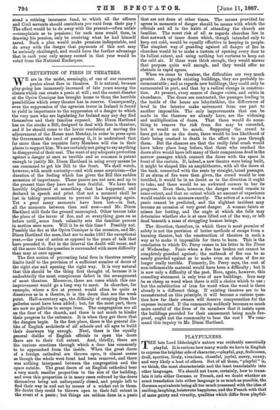LORD RANDOLPH CHURCHILL AND THE SPENDING DEPARTMENTS.
WE do not feel altogether inclined to join in the chorus of condemnation that has been evoked by Lord Randolph Churchill's speech at Wolverhampton. That speech was a long, detailed, and vehement arraignment of the great Spending Departments of the War Office and Admiralty. Lord Ran- dolph Churchill accused those offices not only of waste and extravagance, but of inefficiency. For so doing he has been condemned, and his own previous conduct in regard to the
Army and Navy has been brought up against him to show the worthlessness of his arguments, the insincerity of his inten- tions, and the hollowness of his promises. To us, this way of treating his speech seems entirely unsatisfactory. We have no wish to prove Lord Randolph Churchill consistent—indeed, such a task would be utterly hopeless—or to assert that he is even for the moment moved by a sincere desire to remedy a public evil. We cannot, however, help feeling that the fact of such a speech as his being addressed to a great democratic audience is a subject for congratulation. Nothing in the working of the State machine is more important than the regulation of the country's finances. It is so easy to vote money, and at present it is, comparatively speaking, so easy to collect it, that we forget how that collection is fraught with the most important consequences to the country. Year after year, the work of national tax-raising and national ex- penditure goes on as if it were a part of the natural order of the world. The notion of challenging and examining the pur- poses for which the money is taken from the people is one from which politicians are inclined to shrink with dismay. To make an economy in some one particular, is the height of their ambition. To deal with the matter fundamentally never enters their heads. Yet the uses to which the resources of the nation are put ought to occupy the mind of every elector as of the gravest import. When, then, a politician who has the popular ear directs—from whatever motive—public attention to the way in which our resources are spent, no thinking man should do anything to deprecate such a discussion. Lord Randolph Churchill may merely want to pose as the necessary Chancellor of the Exchequer. He may be weak in his figures, and wrong in most of his conclusions ; but that cannot prevent the fact that the public owe him a debt of gratitude for having attempted to draw the attention of the electors to the facts of the national expenditure. Let us by all means, if it is necessary for our safety, increase our annual fighting expendi- ture in ten years by £5,000,000 a year; but let us closely and carefully watch the steps of that increase, and above all let us see that increased expenditure shall never take place with- out increased efficiency.
If so much is allowed for the importance of the subject of Lord Randolph Churchill's speech, and for the necessity that exists for examining most carefully his facts and figures, we willingly admit that in many respects his attack on the War Office and Admiralty is as misleading and unfair in its general lines of argument as it is in those particular instances which, quoted by him, have since been proved to be altogether inaccurate. Lord Randolph's leading principle will no doubt be generally admitted. It is, put shortly,—' Spend whatever is necessary for safety, but see that you get your money's-worth.' This principle he enforces by another, which may be stated in his own words,—" Economy and efficiency are inseparable, and free expenditure and inefficiency are equally inseparable." This, of course, is stated too generally, and might easily be pressed too far. Still, taken in the proper way, it no doubt contains the truth. In stating the facts which lead him to this conclusion, Lord Randolph Churchill begins by making a very successful hit at Lord Wolseley. Lord Wolseley, in grumbling at the way in which the War Office was starved by the Treasury, and forced into reductions and economies, seems to have said that if things went much further, the Army would be reduced to two men and a boy. No doubt this was an extremely misleading way of speaking, and one too often indulged in by the military authorities. From it the public would be induced to believe that the Army was gradually being economised out of existence. Lord Ran- dolph Churchill's reply is absolutely crushing. If the year 1875 is taken and compared with the present year, instead of any tendency to reduce the Army to Lord Wolseley's two men and a boy having taken place, the Army of the Empire—i.e., the English and Indian Armies taken together—has been increased during the twelve years by no less than 128,000 men. Of course, it must be remembered that this very large figure includes the increase of Volunteers, Militia, and Reserve. Still, the mere increase of Regular troops in England has amounted to 12,000 men. Lord Randolph Churchill pro- ceeds to show how, to meet this numerical increase— which he does not appear to challenge as excessive in itself—a sum of only £700,000 would be required, and yet how, notwithstanding, the increase of the expenditure was actually £2,000,000. In the Navy, the disproportionate nature of the increase in ships and men, and in the expenditure, is still more remarkable. Practically speaking, the Navy, if we take the number of officers and men and ships, stands in exactly the same position for efficiency as it did in 1875, and yet over £2,000,000 a year more is expended upon it than formerly. Putting the two together—we quote the speaker's own words —" the increased cost of the Army and Navy is not accounted for by the numerical increase further than by £900,000 out of the £5,000,000 odd." So far, Lord Randolph Churchill appears to us to have made out a very strong case for the necessity of increased vigilance in the watch kept by the country over the national expenditure. When, however, he proceeds to try and make his hearers believe that our expenditure must be extravagant because we nominally spend more on our Army and Navy than the Germans and French, he goes far beyond the limits of legitimate analogy. Besides, the argument drawn from foreign analogy might, we believe, with equal ease be used against his strongest argument. If the French War Votes of 1875 are compared with those of 1887, they could be, no doubt, used as an argument to prove that the increase in our expenditure is not excessive. But, putting this aside, it is quite useless to compare the money spent on a conscript Army with that spent on a volunteer Army. The German War Budget may nominally be only .£21,000,000, but that is because its private soldiers and sailors receive no pay to speak of, but are forced by law to join the ranks. Of course, Germany does not in reality save the soldiers pay, for that is just as much lost to the country as if they were paid. The country only pays a part of its taxes in flesh and blood, instead of in gold. It has been calculated that one man in twenty is withdrawn there from the work of the civil population to bear arms, and that another is engaged in supporting the soldier at his drill. This is probably an exaggerated calculation, being only true when all who are liable are actually called out ; but in any case, a tax is laid on Germany by the forced military service which, if it appeared in the Budget, would raise it far above the English expenditure. Into the other false arguments and inaccuracies of the speech we have not time to go at length. One or two, however, may be noticed. Lord Randolph Churchill waxes very indignant because, after the bombard- ment of Alexandria, the ironclads were left with very few rounds of ammunition, and would, if the French fleet had been hostile, have been left entirely at its mercy. This, no doubt, sounded to Lord Randolph Churchill's hearers a very monstrous state of things. A writer in the Pall Mall Gazette, however, points out that the ships were actually carrying 30 per cent, more rounds of ammunition than is generally carried by foreign fleets, and that it was only because they were engaged in the exceptional and unforeseen work of bombarding forts, that their ammuni- tion was reduced to so low an ebb. Lord Randolph Churchill's stories of the defective steering of the 'Ajax' and the 'Agamemnon' are capable of an equally simple explanation. His remark about the latter of these vessels is shown by the writer in the Pall Mall Gazelle to have been singularly unfortunate. "The ' Agamemnon,' " said Lord Randolph Churchill, "has been sent to the China Straits [sic], and you will never hear of her again." As a matter of fact, she has returned from China already. His account of the Imperieuse ' is equally misleading. No doubt his arraignment of the field artillery that Lord Wolseley has described as the word in Europe, of the rifles that are obsolete and worthless, of the bayonets that bend and the sabres and cutlasses that would break if they were used, and of the utter lack of transport, is true enough. Still, it must be remembered that the policy of which Lord Randolph Churchill is the last enforcer is a good deal responsible for the mischief. The Spending Departments produce their Estimates. The Chancellor of the Exchequer peremptorily demands that they shall be reduced. The offices cannot make the reductions in the numbers of men, because that would at once be noticed in the House of Commons, and get the Government into trouble. They have, therefore, to make the reduction in things that do not show on the surface,—that is, in general efficiency. It may be possible to reorganise the Departments, and effect a tremendous saving. The way, however, to do this, is to do it from above. It is no use to tell the old, unreformed, and inefficient offices,—' You must save a million, that is all I know. Save it where you please.' Of course, such saving will not he in salaries or men, but in efficiency.
There is one point which has not been much criticised in Lord Randolph Churchill's speech, but which, however, we feel is worthy of serious attention—the question of the growth of the non-effective vote for the Army and Navy —i.e., the growth of the pensions. Would it not be far better to abolish pensions altogether, substituting in their stead a retiring insurance fund, to which all the officers and Civil servants should contribute pro raid from their pay? The effect would be to do away with the present—often unfair —complaints as to pensions; for each man would then, in drawing his pension, only be receiving what he had himself saved. Such a plan would make pensions indisputable, and do away with the danger that payments of this sort may be seriously challenged, and would have the further advantage that in each year only money earned in that year would be voted from the National Exchequer.




































 Previous page
Previous page